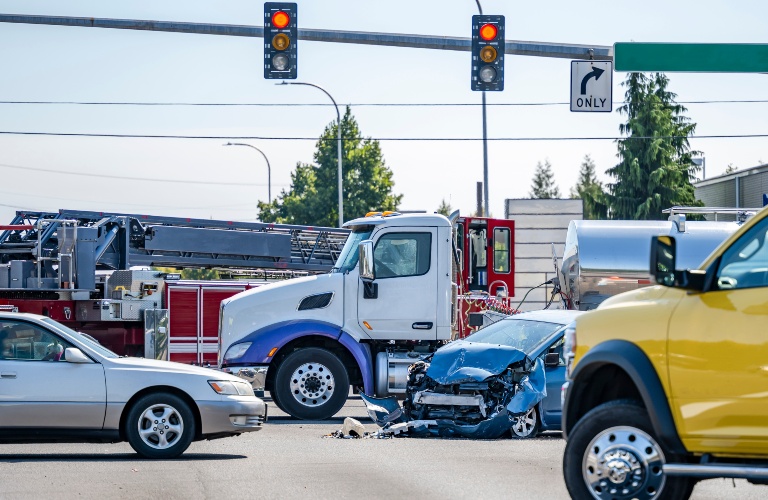Pursuing compensation after a truck accident in Illinois involves several steps. It can be a complex process, but a knowledgeable attorney will guide you through it while you focus on healing. Here’s an overview of how a typical truck accident claim progresses and the key legal considerations in Illinois:
Investigation and Evidence Gathering
Your lawyer will launch a thorough investigation. This includes reviewing the police accident report, photographing the vehicles and scene (or obtaining this evidence if you were unable), interviewing witnesses, and collecting any available video footage (traffic cameras or dashcams). Crucially in truck cases, it also involves obtaining trucking-specific evidence: the driver’s logs and ELD data, the truck’s event data recorder (“black box”), maintenance and inspection records, dispatch instructions, and the driver’s qualification and training file. We may hire accident reconstruction experts to analyze how the crash occurred. This phase is critical – the goal is to build a strong liability case showing how the truck driver or company was at fault.
Identifying Liable Parties
As mentioned, liability in truck crashes can extend to multiple parties. Early on, your attorney will determine all potential defendants. This could include the truck driver, the trucking company (for the driver’s actions and for any negligent hiring/training or maintenance issues on their part), the freight loader (if shifting cargo was an issue), a maintenance contractor, or others. Illinois follows a rule of comparative negligence, meaning each party (including possibly you, the injured person) can be assigned a percentage of fault. Don’t be surprised if the trucking company tries to argue that another driver or even you caused or contributed to the accident. Your lawyer’s job is to counter such claims with evidence and keep the focus on the truck’s negligence. (Important: Illinois uses a modified comparative fault rule. If you are 50% or less at fault, you can still recover damages, reduced by your fault percentage. But if you are found 51% or more at fault, you would be barred from recovery. This is why having an attorney present the evidence is so crucial.)
Dealing with Insurance Companies
In a serious truck accident, you may be contacted by the trucking company’s insurance adjusters soon after the crash. It’s usually best to let your attorney handle all communication. The insurer may offer a quick settlement, but these early offers are often far below what your case is truly worth, especially if your injuries have not fully resolved. Your lawyer will calculate the full extent of your damages – including medical bills (past and future), lost income, pain and suffering, emotional distress, and any permanent impairment or scarring. We will then enter negotiations with the insurer armed with the facts of fault and the documentation of your losses. Many truck accident claims settle through negotiations once the insurance company sees you have built a strong case. However, if they refuse to offer a fair amount…
Filing a Lawsuit
Your attorney will prepare a formal lawsuit if a reasonable settlement can’t be reached. In Illinois, the complaint will be filed in the appropriate state court (or federal court, in some cases) and detail how the defendants were negligent and the damages you are seeking. It’s essential to file suit before the statute of limitations expires (more on that below). Once the lawsuit is filed, both sides engage in discovery – exchanging evidence, taking depositions (sworn statements) of parties and witnesses, and possibly involving expert witnesses (like accident reconstructionists or medical experts) to support your case. Truck accident litigation can be intensive due to the technical details and large stakes involved.
Illinois Statute of Limitations (Deadline to File)
Illinois law places a time limit on how long you have to file a personal injury lawsuit. In most truck accident injury cases, the limit is two years from the date of the accident. This deadline is set by 735 ILCS 5/13-202 of the Illinois Compiled Statutes, which states that actions for damages for personal injuries “shall be commenced within 2 years next after the cause of action accrued” . If you miss this two-year window, you will likely lose your right to bring a claim forever. (There are a few exceptions – for example, if the injured person is a minor, the 2-year clock might start at age 18; or if a government entity is a defendant, a shorter notice period or limit may apply.) Your lawyer will make sure all filings happen well before any deadlines.
Resolution – Settlement or Trial

Even after a lawsuit is filed, settlement can occur at any time. In fact, many cases settle on the “courthouse steps” right before trial, or even during trial, as pressure mounts on the defendants. If the case does go to a trial, your attorney will present your case to a jury, aiming to prove the defendants’ liability and the extent of your damages. A well-prepared truck accident lawyer will use all the evidence gathered (skid mark analysis, logbook violations, expert testimony, etc.) to make a compelling case. If successful, the jury may award you compensation (damages). In Illinois, you can recover both economic damages (medical expenses, lost wages, property damage) and non-economic damages (pain and suffering, loss of normal life). Illinois does not cap damages in truck accident cases, so the jury can award what is deemed fair given the evidence. (Rarely, punitive damages might be sought if the defendant’s conduct was especially egregious, such as a trucking company willfully ignoring safety regulations.)
Contact Fabbrini Law Group Today for a Consultation
Throughout this legal process, having a lawyer experienced in Illinois truck accident claims is invaluable. We know the local court procedures, how to properly value a truck injury case, and how to present complex evidence about trucking regulations in a way that a jury will understand. Most importantly, we take the burden off you during a very stressful time. Our goal is to secure the maximum compensation you deserve so you can focus on recovery. Contact us today for a consultation.


